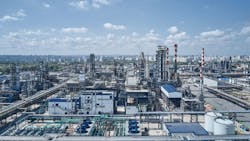Gazprom Neft launches new complex, confirms next modernization phase at Moscow refinery
PJSC Gazprom Neft subsidiary JSC Gazpromneft-MNPZ has officially inaugurated its previously announced Euro+ combined oil refining unit (CORU) as part of the second phase of an ongoing modernization and upgrade of its 13.1-million tonne/year Moscow refinery (OGJ Online, May 5, 2017; June 2, 2016).
Russian President Vladimir Putin launched the new Euro+ CORU remotely via video link in a ceremony held on July 23, Gazprom Neft said in a release.
The core project of the Moscow refinery’s Phase 2 modernization program, the 98-billion rubles Euro+ CORU—once fully operational—will further improve the manufacturing site’s overall environmental performance as well as its yield of light-end, Euro 5-quality petroleum products, including gasoline, diesel, and aviation kerosine, according to the operator.
With startup activities at the new complex now under way, Gazprom Neft said it will immediately begin decommissioning of five obsolete, earlier-generation installations at the refinery following this year’s full commissioning of the Euro+ CORU.
"This launch marks the completion of a crucially important major project,” Putin said during the inauguration ceremony. “With commissioning of the [Euro+ CORU], 80% of the Moscow refinery will now have been modernized. And, in this case, not only have production and other facilities been built and upgraded—new, modern treatment facilities have also been constructed, and regular air-quality monitoring has been put in place.”
Alongside technologies to reduce environmental impacts at the site, the Euro+ CORU also implements use of an entirely new level of digital technologies in the Russian refining sector, including installation of 15,000 digital receivers throughout the complex that collect and transmit real-time data to the Moscow refinery’s smart-production control system to allow remote control of all necessary production parameters and processing activities, as well as remote monitoring of all equipment to ensure safe operations.
“Even in initial design, we created a complete digital twin of the complex, [on] which construction was subsequently based. Big Data is now coming through from the [Euro+ CORU] and feeding into that digital model, meaning we can—using machine learning and predictive analytics—manage the end-to-end planning of production processes, in real time. This approach ensures maximum safety and efficiency in the [complex’s] operations, as well as making it possible for us to respond flexibly to market demand,” said Alexander Dyukov, Gazprom Neft's chief executive officer and chairman of its management board.
Dyukov also confirmed Gazpromneft-MNPZ will also be moving forward with Phase 3 of the Moscow refinery’s modernization program, which will focus on further improving environmental performance and deepening refining capabilities at the site.
Between the 2011 start and 2025 completion of GazpromNeft-MNPZ’s refinery modernization program, Dyukov said he expects Gazprom Neft’s total investment in the Moscow site will reach more than 350 billion rubles.
Since 2011, Gazprom Neft has invested more than 200 billion rubles in modernization activities at the Moscow refinery, with an additional 160 billion rubles due for investment on reconstruction works planned during the program’s third phase, said Russia's Energy Minister Alexander Novak.
Gazprom Neft has yet to confirm specific projects to be included in Phase 3 of the Moscow refinery’s modernization program.
Euro+ CORU overview
Official launch of the Euro+ CORU follows Gazprom Neft’s start of precommissioning activities at the complex in early 2019, the company said in a Jan. 31, 2019, release as well as its latest annual report to investors.
GazpromNeft-MNPZ previously completed installation in 2018 of all large-scale equipment for Euro+ CORU, including installation of the highest section of the catalytic reformer to enable production of high-performance Euro 5-quality gasoline (OGJ Online, June 18, 2018).
Designed to replace outdated equipment and be fully compliant with Russia’s current ecological standards and environmental regulations, the Euro+ CORU project includes the following:
- A 6-million tpy primary atmospheric-vacuum distillation unit (CDU-VDU 6).
- A 1-million tpy gasoline reforming unit.
- A 2-million tpy diesel (distillate) hydrotreating unit, which includes an iso-dewaxing unit.
- A gas fractionation unit.
- An amine regeneration unit.
Alongside reducing the refinery’s total environmental impact from processing activities by 11%/tonne of crude processed, the project will improve the complex’s operational energy efficiency as well as increase its intermaintenance period to 4 years from a previous 2-year cycle (OGJ Online, July 23, 2015).
Other Phase 2 modernization works
As part of the Phase 2 modernization, GazpromNeft-MNPZ most recently commissioned a biosphere treatment plant at the Moscow refinery in 2017, which has equipped the site to achieve a nearly two-fold reduction in its water consumption for refining processes in 2019 (OGJ Online, Mar. 27, 2020).
During the 2 years since its startup, the Moscow biosphere treatment plant additionally has enabled a nearly five-fold reduction in the refinery’s consumption of river water, as well as permitted nearly 80% of treated process wastewater to return to the production cycle, with the remainder sent to city treatment facilities. Wastewater volumes from the refinery, however—as well as their burden on city treatment systems—have fallen more than three times from pre-2017 levels since commissioning of the biosphere plant.
Since beginning the Moscow modernization and reconstruction program in 2011, various initiatives completed at the site have enabled the refinery to reduce its premodernization environmental impacts by 50%, with anticipation of another 50% reduction in impacts to occur once all Phase 2 works are completed in 2021, Gazprom Neft said on July 23.
Completion of the Euro+ CORU also has allowed the refinery to cut its energy consumption by 7%, according to the operator.
About the Author
Robert Brelsford
Downstream Editor
Robert Brelsford joined Oil & Gas Journal in October 2013 as downstream technology editor after 8 years as a crude oil price and news reporter on spot crude transactions at the US Gulf Coast, West Coast, Canadian, and Latin American markets. He holds a BA (2000) in English from Rice University and an MS (2003) in education and social policy from Northwestern University.

